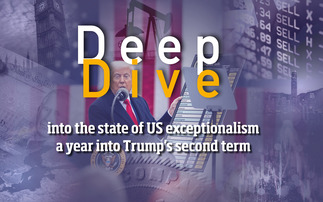Janus' John Eisinger explains why the end of quantitative easing could lead to declining inflation around the world.
To continue reading this article...
Join Investment Week for free
Signup and gain exclusive members-only insights - all free of charge!
- Unlimited access to real-time news, analysis and opinion from the investment industry, including the Sustainable Hub covering fund news from the ESG space
- Get ahead of regulatory and technological changes affecting fund management
- Important and breaking news stories selected by the editors delivered straight to your inbox each day
- Weekly members-only newsletter with exclusive opinion pieces from leading industry experts
- Be the first to hear about our extensive events schedule and awards programmes








